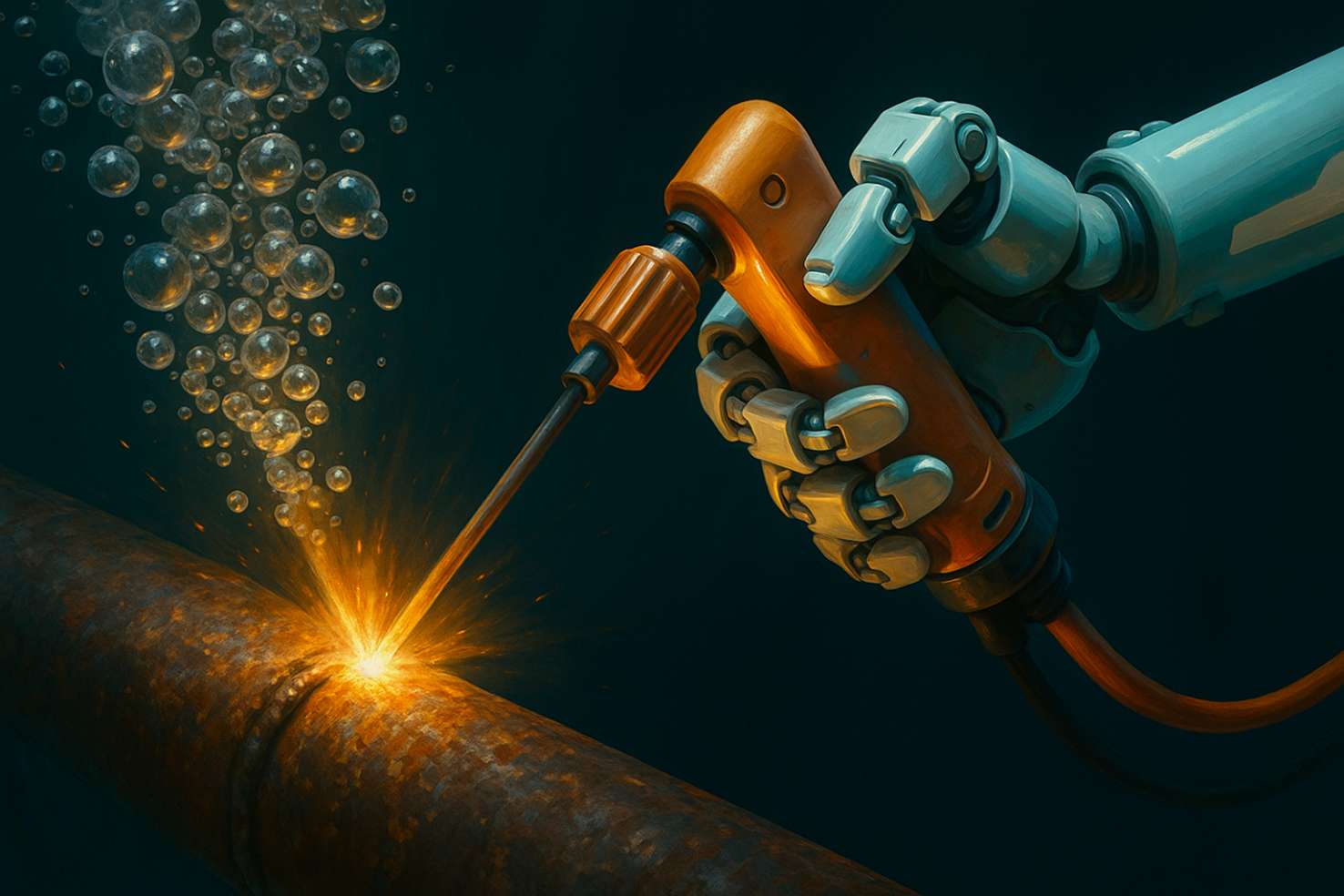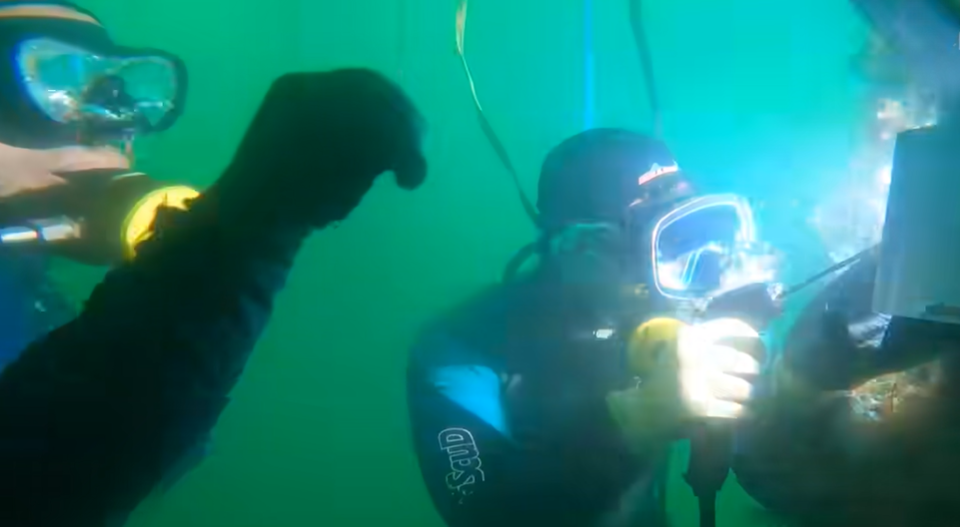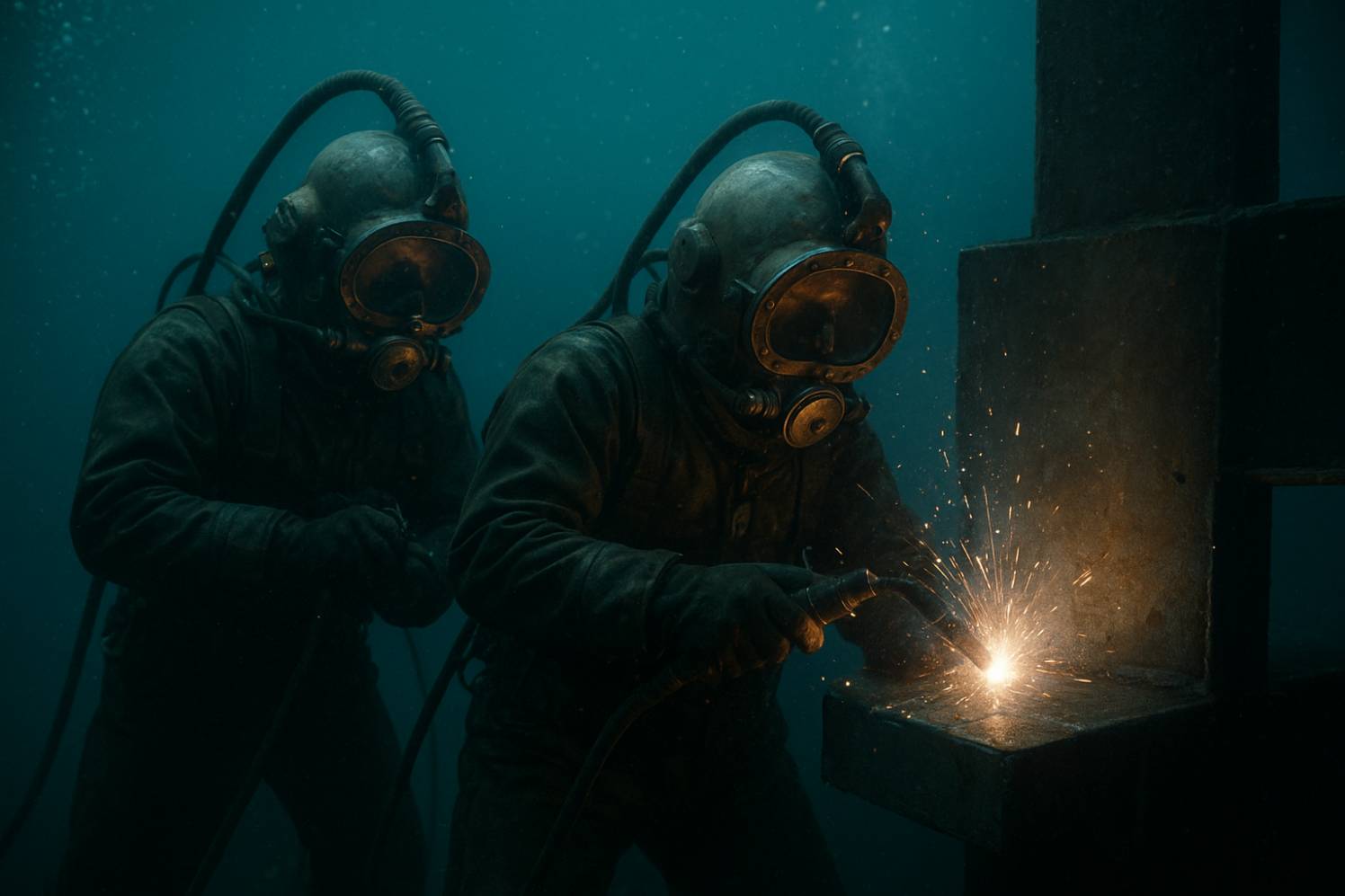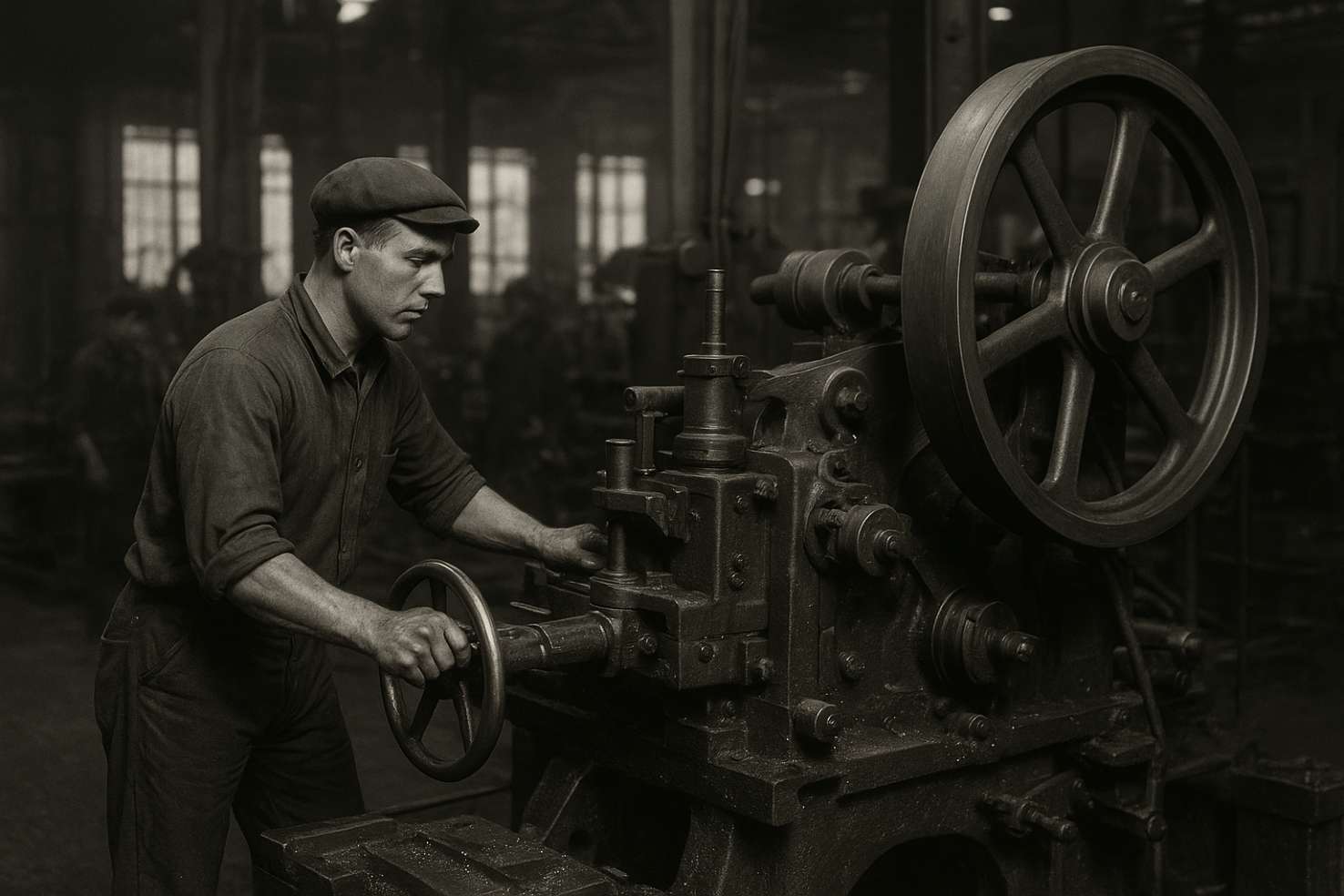Underwater welding isn’t just about welding; it’s about diving into the deep blue to complete some of the most challenging and rewarding tasks in the world.
Imagine yourself working hundreds of feet underwater, repairing oil rigs, restoring ships, or welding pipelines, all while submerged in an environment where safety is paramount, and the stakes are high. It’s no surprise that the pay is as high as the risks.
I remember the first time I heard about underwater welding. The idea of combining two worlds—commercial diving and welding—was fascinating. It seemed like a career out of a movie, but then I realized it was very real.
The more I dug into it, the more I discovered that not only is underwater welding lucrative, but it also carries some serious safety considerations.
So, how much do underwater welders make, and is it a good career path for you? Let’s dive in!
How Much Do Underwater Welders Make?
When it comes to underwater welding, salary varies significantly depending on a range of factors.
From your level of experience to the location of the job, you can expect your income to fluctuate.
On average, underwater welders in the United States earn about $98,156 per year as of 2025, though this is just a general figure that can go up or down depending on various factors.
- Entry-Level Welders: If you’re just starting out, expect to make between $40,000 and $60,000 annually. Many beginners begin as tenders or assistants, making $25,000-$40,000 while learning the ropes of underwater welding.
- Mid-Career Welders: With 5+ years of experience, your salary can rise to $60,000-$80,000. This range typically applies to those who start getting into more complex underwater tasks like working on offshore oil rigs.
- Experienced Welders: After 10+ years in the industry, seasoned welders can make anywhere from $80,000 to $100,000+ annually, especially if they’re working in specialized offshore roles or involved in challenging projects.
- Saturation Divers: For those working at extreme depths and living in pressurized environments, salaries can soar. Experienced saturation divers can make anywhere from $100,000 to $300,000 per year. In fact, for those diving beyond 500 feet, it’s not unheard of for welders to earn up to $500,000 annually.
Factors That Influence Underwater Welder Salaries
Several factors can significantly impact your earning potential in underwater welding:
- Experience: Just like any other profession, the more experience you have, the more you can charge for your services. Entry-level jobs will have a much lower pay, while experienced welders in offshore projects will earn a premium.
- Location: If you’re working in offshore environments like oil rigs in the Gulf of Mexico, expect to earn higher wages than if you’re working inland on smaller projects. Offshore positions come with extra risk, so they naturally come with a better pay package.
- Certifications: Specialized certifications, such as Saturation Diving Certification or Class A/B Underwater Welding Certification, can increase your salary by a significant margin.
- Hazard Pay and Overtime: Offshore and deep-water jobs often come with hazard pay, and the opportunity for overtime pay can boost your annual income by 10-25% or more.
Here’s a salary table summarizing the potential earnings for underwater welders based on experience, location, and specialization:
| Experience Level | Salary Range (US) | Key Factors |
|---|---|---|
| Entry-Level (0-3 years) | $40,000 – $60,000 annually | Starting as tenders or assistants before welding tasks |
| Mid-Career (4-9 years) | $60,000 – $90,000 annually | Gaining experience in more complex offshore roles |
| Experienced (10+ years) | $80,000 – $120,000+ annually | Offshore specialists or critical infrastructure work |
| Saturation Divers | $100,000 – $300,000+ annually | Working at extreme depths and living in pressurized environments |
| High-End Earnings | $300,000 – $500,000+ annually (specialized roles) | Saturation diving at depths >500 feet or high-demand projects |
Is Underwater Welding a Good Career?

The short answer: yes. If you love adventure, working in a challenging environment, and enjoy the idea of high-paying jobs that require specialized skills, underwater welding could be an amazing career choice.
Beyond the financial rewards, it’s also a career that offers constant learning opportunities. Whether you’re maintaining large offshore rigs or working on deep-sea pipelines, the variety of projects keeps the job exciting.
However, there are some risks and considerations you should take into account:
- Physical Demands: Underwater welding isn’t for everyone. It requires strong physical and mental stamina, as well as the ability to perform in extreme conditions. You’ll be working with heavy equipment and dealing with high-pressure environments.
- Job Stability: While the job outlook for underwater welders is stable, it can be project-based, meaning there may be times when work is scarce. Being flexible with your work locations and specializing in high-demand areas can help.
- Safety: This leads us to an important consideration—safety. The environment underwater can be risky, and welders must undergo rigorous safety training. Now, let’s talk about that in more detail.
How Safe is Underwater Welding?
Safety is arguably the most critical aspect of underwater welding. The job is inherently risky, and welders need to be vigilant, trained, and prepared for emergencies.
Here’s a quick breakdown of some of the risks:
- Drowning: As you’re working underwater, the risk of drowning is always present. Welders are required to have a diving certification and must use specialized diving equipment like helmets, hoses, and tanks to stay connected to the surface.
- Electric Shock: Welding underwater means working with electricity in a conductive environment. Electrical accidents can be fatal, so understanding electrical safety protocols is essential.
- Decompression Sickness: Welders working at extreme depths need to be aware of the risks of decompression sickness, also known as “the bends.” This occurs when nitrogen bubbles form in the bloodstream after rising too quickly to the surface.
- Pressure and Temperature Extremes: The high-pressure environment can affect the body, and the cold temperatures can increase the likelihood of fatigue or hypothermia. Welders must wear specialized wetsuits or drysuits to handle these elements.
How Long Do Underwater Welders Live?
Underwater welders can have a long lifespan, similar to the general population, if they follow safety protocols and maintain good physical and mental health.
While the profession involves risks like decompression sickness and physical strain, proper safety measures, regular training, and a healthy lifestyle can significantly reduce these risks, ensuring a long and successful career.
Also Read : How Can You Manage Hazards Associated With Breathing in Welding Fumes?
What Are the Safety Measures for Underwater Welders?
 Image source-Business Insider
Image source-Business Insider
To minimize the risks, there are strict safety protocols in place:
- Proper Training: The most critical step is proper training, which covers everything from emergency protocols to equipment handling. You’ll need a combination of diving certifications and welding qualifications.
- Advanced Equipment: Underwater welding requires specialized equipment, including helmets, welding torches, oxygen tanks, and pressure-resistant suits. These are designed to keep you safe while performing your work.
- Regular Monitoring: You’ll be monitored by surface support teams who ensure everything is functioning correctly. Additionally, the team will be ready to respond to emergencies quickly.
- Safety Inspections: Regular inspections of your equipment and dive suits are mandatory. You’ll also be trained to perform pre-dive safety checks on all your tools.
FAQs About Underwater Welding
1. What is the job outlook for underwater welders?
The job outlook for underwater welders is quite positive. The demand for skilled welders in industries such as oil and gas, infrastructure, and even renewable energy is expected to grow.
However, keep in mind that the job can be project-based, which means there might be busy seasons and slow periods.
2. How long do underwater welders live?
Underwater welding is demanding, but with proper safety protocols and training, welders can have long careers.
Many welders live well into their 60s or longer, especially if they’re conscious about maintaining their health and adhering to safety regulations.
3. What’s the best way to start a career in underwater welding?
To start, you’ll need to complete commercial diving school and acquire necessary certifications for underwater welding. Then, consider starting with a diving or assisting job to build experience before taking on more complex welding tasks.
The High-Risk, High-Reward Career
Underwater welding offers exciting career opportunities with significant earning potential, but it’s not for the faint of heart.
It’s a challenging career that comes with high financial rewards, but it also demands physical stamina, mental resilience, and a strong commitment to safety.
If you’re someone who thrives in high-risk, high-reward situations and is willing to invest in the necessary training and certifications, underwater welding can be a fulfilling career that allows you to dive into the depths—both literally and financially.
Keep safety at the forefront of your mind, and you’ll be well-equipped to navigate this thrilling profession.
And a quick tip: Don’t rush into it! Take the time to gain as much knowledge as possible, and always prioritize safety.
The sea may be unpredictable, but with the right training, you’ll be prepared for whatever comes your way.




